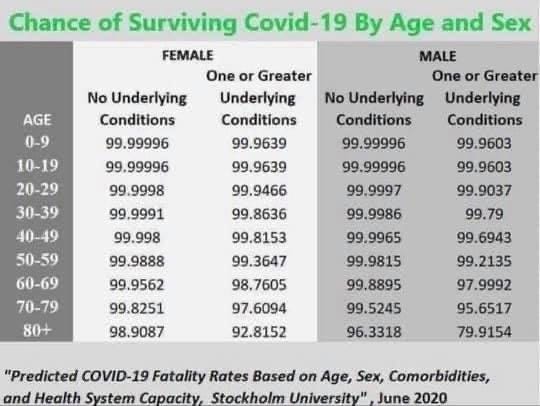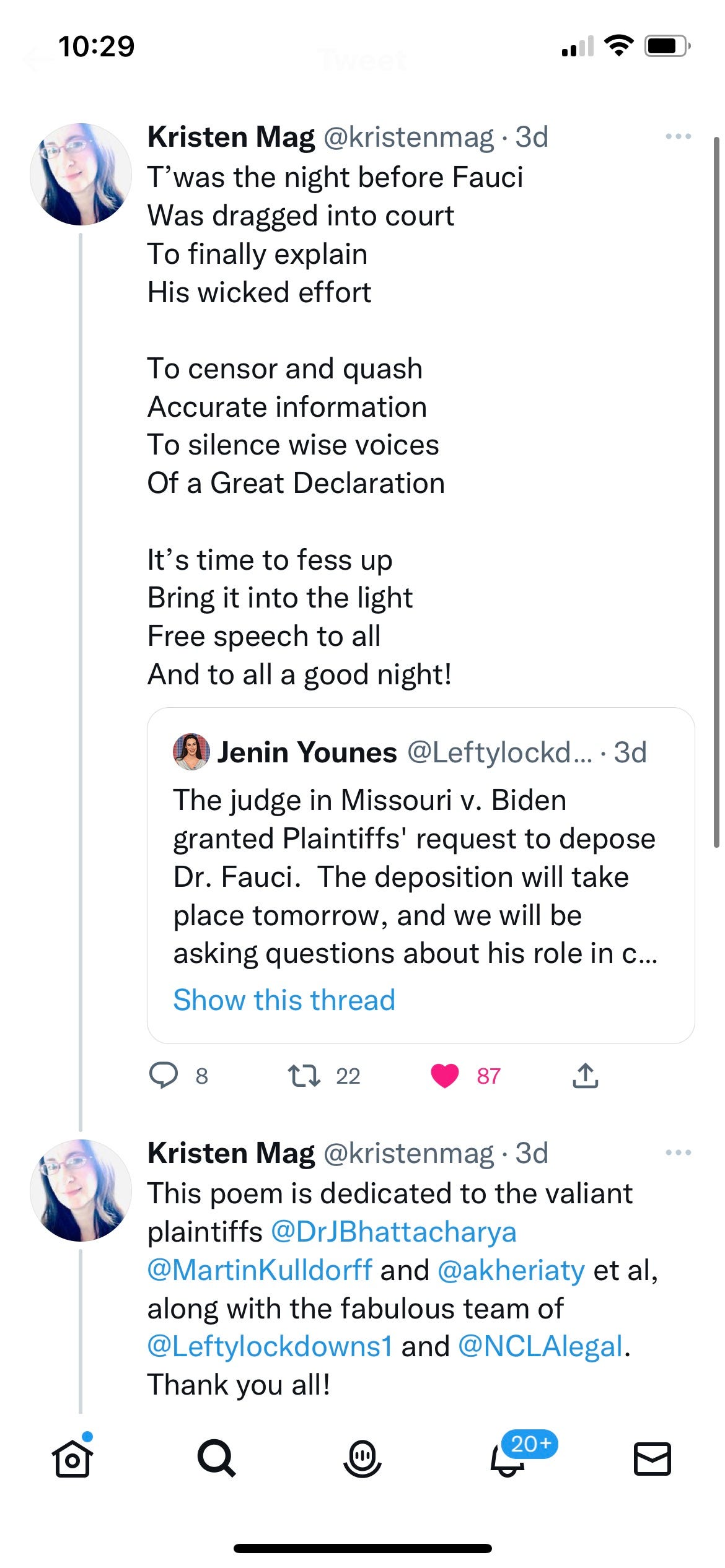Legal Update: My Case Against the University of California
My commentary on the 9th Circuit's ruling, which recently upheld the District Court's ruling against me in my case challenging vaccine mandates.
Last week, the 9th Circuit Federal appellate court upheld the district court’s ruling against me in my case, Kheriaty v. Drake, wherein I challenged the University of California’s vaccine mandate on behalf of individuals with natural immunity. This was disappointing. As I explained in a previous post, I argued that fundamental right of informed consent—a right I believe is protected by the constitution under the 14th Amendment—was implicated in this case. Thus, the court should have applied a strict (or at least intermediate) level of scrutiny. This would have allowed the scientific evidence to actually be weighed in my case.
The court disagreed. In the ruling, the judges explained the judicial concept of a fundamental right as follows:
Contrary to Kheriaty’s claim, rational basis review—not strict scrutiny—applies here. A court will apply strict scrutiny when the challenged government action infringes on a fundamental right. Reno v. Flores, 507 U.S. 292, 301-02 (1993). A fundamental right must be either enumerated in the Bill of Rights or “deeply rooted in this Nation’s history and tradition . . . and implicit in the concept of ordered liberty, such that neither liberty nor justice would exist if they were sacrificed.” Washington v. Glucksberg, 521 U.S. 702, 720-21 (1997) (cleaned up). When determining whether an unenumerated right is fundamental, a court defines the liberty interest at issue “in a most circumscribed manner” and examines whether there is a specific historical practice of protecting the defined interest. Khachatryan v. Blinken, 4 F.4th 841, 856 (9th Cir. 2021) (quoting Obergefell v. Hodges, 576 U.S. 644, 671 (2015)).
The judges then determined that I had not offered “any appropriate historical example to establish a ‘fundamental right’ to be free from a vaccine mandate at a workplace.” In short, the federal courts have never delineated any prima facie limits to vaccine mandates instituted by public or private employers. Therefore, the court applied only a “rational basis” level of review in my case. A rational basis review examines whether a rule or law is “rationally related to a legitimate state interest,” in this case, advancing health and safety at the University.
According to this extremely broad criteria, the University did not need to demonstrate that their vaccine mandate actually achieved its public health purpose; they did not need to demonstrate that it was narrowly construed so as not to encompass people (like those with natural immunity) that would not benefit; they did not need to demonstrate that benefits outweighed harms; they did not need to demonstrate that the mandate was grounded in solid scientific evidence. They only needed to state that it was done with the intention of improving public health and safety and that it might plausibly achieve that purpose. That’s it.
As the judges explained in their ruling: the University cited their studies/experts and Kheriaty cited his studies/experts, and the court was under no obligation to weigh or adjudicate the scientific evidence submitted:
[Kheriaty] maintains that his scientific studies show that previous COVID-19 infections confer natural immunity and that the school’s vaccine policy thus does not advance the health and safety of the university’s community. Assuming the validity of his studies’ conclusions, as we must, Kheriaty may have a valid policy point in criticizing the school’s COVID-19 policy. But under a rational basis review, it is not enough for a party to merely cite scientific studies challenging the government’s classification policy…. The school cited its own studies that support its vaccination policy—and that is enough for the policy to survive rational basis review.
Deference was thus entirely on the side of the University and empirical evidence or scientific studies were not scrutinized. The science was clearly in my favor in this case: this is even more true today than it was when I originally filed the case, as the CDC recently admitted, and as I wrote about in this post:
But the empirical evidence—and even the CDC’s updated recommendation to not discriminate between vaccinated and unvaccinated individuals—was not considered in the court’s deliberations.
Not surprisingly, the court cited the Jacobsen v. Massachusetts precedent to argue that freedom from a vaccine mandate is not a fundamental right. I maintain, however, that the court misrepresented the ruling in Jacobsen and its implications. After asserting that I failed to offer a relevant historical example to establish a “fundamental right” to be free from a vaccine mandate, the ruling stated: “To the contrary, the Supreme Court upheld a much more onerous vaccine requirement in Jacobson v. Massachusetts, 197 U.S. 11, 12-13 (1905).” But as I have written here previously, the Jacobsen precedent, and the penalties applied in that case, were actually much more modest than the covid vaccine policy of the University of California—and so many other institutions—during the pandemic:
Jacobson was a narrow ruling at the time and the precedent it set should be construed as modest. Justice Harlan’s decision in this case over one hundred years ago upheld the State’s power to impose a nominal fine—$5, the equivalent of $155 today adjusted for inflation—on a person who refused to be vaccinated against smallpox during an outbreak in Boston. Keep in mind that the mortality rate for smallpox at that time was 31%, compared to a much smaller mortality rate for Covid:
Even though the smallpox threat at issue in Jacobsen was far deadlier than covid, the State's action was clearly less punitive and coercive than the current vaccine mandates. A $155 fine is clearly not the same as the threat of losing one’s job or being excluded from attending school.
Given the massive inflation we’ve seen since I wrote this last October, the $155 figure would have to be adjusted upward a bit more; but it’s still miles away from a penalty like loss of employment. I am puzzled as to why the 9th Circuit maintained that Jacobsen upheld “a much more onerous vaccine requirement.” I also argued in the post cited above that this is not the first time the Jacobson precedent has been misapplied by the Court in acts of expansive overreach, citing the notorious 1927 Supreme Court case of Buck v. Bell, which upheld eugenics-era involuntary sterilization laws.
As I argued there, “Our jurisprudence has evolved and developed enormously since 1905, including tiered levels of scrutiny, and legal doctrines related to bodily autonomy and informed consent. Now is a good time for the Court to articulate the limits of the Jacobson precedent to avoid another disastrous decision like Buck v. Bell.” Clearly, the 9th Circuit court was in no mood to articulate any principled limits to this precedent. Which leaves us in the following situation, according to the 9th Circuit court: Any employer, public or private, large or small, can legally impose a mandate on employees to take any vaccine which has a plausible public health justification, regardless of what the scientific evidence says about the safety or efficacy of the vaccine.
The CDC changed its definition of a vaccine during the pandemic to accommodate the novel mRNA gene therapies. Thus, even though they do not actually function as vaccines in stopping infection or transmission, and even though efficacy against symptomatic illness declines rapidly for these injections, these novel gene therapies can be imposed on populations by any employers at any time. I respectfully submit that this does represent a violation of fundamental human rights.
Many people have asked me whether I plan to appeal this case to the Supreme Court. The answer at this point is that I am more than willing to do so if it would be helpful, but I am not sure yet whether an appeal is advisable. If the highest court in the land upholds the 9th Circuit’s ruling, that would set an even more authoritative (and bad) precedent that will be hard to overturn. Perhaps my case is not the best test case to articulate the necessary limits to the Jacobsen precedent. Perhaps the issue of limiting vaccine mandates is better dealt with through legislative means, after building sufficient popular and political support. I will continue to explore the various options.
In the meantime, rest assured that I am far from finished with this issue. In fact, I am just getting warmed up. The right of informed consent for medical interventions, as articulated in the Nuremberg Code, is foundational for any decent, civilized society. We will encounter setbacks and temporary defeats in this battle, but we should not concede or abandon the battlefield. Victory here may talk longer than we initially hoped, but the fight will continue. I remain undeterred.
In the meantime, I am very grateful to all of you, my dear readers, for your continued encouragement and support. And I will continue to pose updates on my other legal cases in the fight against medical censorship and for free speech (Hoeg v. Newsom in California and Missouri v. Biden at the Federal level). Stay tuned.
On a more positive note, our attorneys in Missouri v. Biden questioned Anthony Fauci last week during his seven hour deposition. The court ordered the deposition transcript sealed, but we are allowed to comment on it publicly. I’ll be posting more on it soon. In the meantime, I though I’d share this lovely poem, commemorating the occasion…








I don’t get this. The stupidity of allowing government coercion of a medical treatment even if it causes harm and doesn’t work is shocking and could easily lead down a dark and dangerous road - particularly with the climate alarmist pro depopulation lunatics in charge right now. But more than that, only the EUA shots were actually available until summer 2022. There were no FDA approved vials. This court case essentially says the government or private employers can coerce experimental medical procedures so long as they can craft a persuasive, even if completely dishonest, narrative. This is insane. Mengele could only dream if that kind of power. Sad crazy world we live in.
Very disappointing... I still pray and have faith that you will be vindicated. 🙏🏻